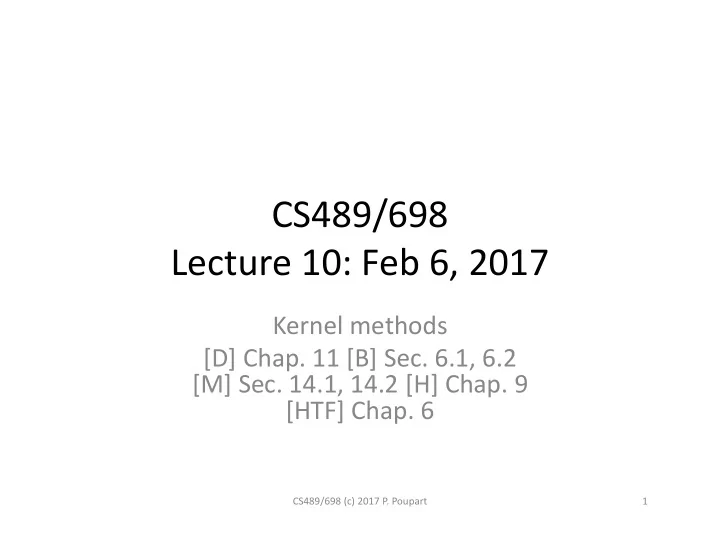

CS489/698 Lecture 10: Feb 6, 2017 Kernel methods [D] Chap. 11 [B] Sec. 6.1, 6.2 [M] Sec. 14.1, 14.2 [H] Chap. 9 [HTF] Chap. 6 CS489/698 (c) 2017 P. Poupart 1
Non-linear Models Recap • Generalized linear models: • Neural networks: CS489/698 (c) 2017 P. Poupart 2
Kernel Methods • Idea: use large (possibly infinite) set of fixed non- linear basis functions • Normally, complexity depends on number of basis functions, but by a “dual trick”, complexity depends on the amount of data • Examples: – Gaussian Processes (next class) – Support Vector Machines (next week) – Kernel Perceptron – Kernel Principal Component Analysis CS489/698 (c) 2017 P. Poupart 3
Kernel Function • Let be a set of basis functions that map inputs to a feature space. • In many algorithms, this feature space only appears in the dot product of input pairs . • Define the kernel function to be the dot product of any pair in feature space. – We only need to know , not CS489/698 (c) 2017 P. Poupart 4
Dual Representations • Recall linear regression objective • Solution: set gradient to 0 is a linear combination of inputs in feature space CS489/698 (c) 2017 P. Poupart 5
Dual Representations • Substitute • Where and • Dual objective: minimize with respect to � CS489/698 (c) 2017 P. Poupart 6
Gram Matrix • Let be the Gram matrix • Substitute in objective: � � � � � � � � � � � • Solution: set gradient to 0 �� • Prediction: where is the training set and is a test instance CS489/698 (c) 2017 P. Poupart 7
Dual Linear Regression • Prediction: • Linear regression where we find dual solution instead of primal solution w . • Complexity: – Primal solution: depends on # of basis functions – Dual solution: depends on amount of data • Advantage: can use very large # of basis functions • Just need to know kernel CS489/698 (c) 2017 P. Poupart 8
Constructing Kernels • Two possibilities: – Find mapping to feature space and let – Directly specify • Can any function that takes two arguments serve as a kernel? • No, a valid kernel must be positive semi-definite – In other words, must factor into the product of a transposed matrix by itself (e.g., ) – Or, all eigenvalues must be greater than or equal to 0. CS489/698 (c) 2017 P. Poupart 9
Example • Let CS489/698 (c) 2017 P. Poupart 10
Constructing Kernels • Can we construct directly without knowing ? • Yes, any positive semi-definite is fine since there is a corresponding implicit feature space. But positive semi-definiteness is not always easy to verify. • Alternative, construct kernels from other kernels using rules that preserve positive semi-definiteness CS489/698 (c) 2017 P. Poupart 11
Rules to construct Kernels • Let and be valid kernels • The following kernels are also valid: � � 1. � � � � 2. � � � 3. is polynomial with coeffs 0 � � � 4. � � � � 5. � � � � � 6. � � � � 7. � � � � 8. is symmetric positive semi-definite � � � 9. � � � � � � � � � 10. � � � � � � � where � CS489/698 (c) 2017 P. Poupart 12
Common Kernels • Polynomial kernel: – is the degree – Feature space: all degree M products of entries in – Example: Let and be two images, then feature space could be all products of M pixel intensities • More general polynomial kernel: with – Feature space: all products of up to M entries in CS489/698 (c) 2017 P. Poupart 13
Common Kernels � � • Gaussian Kernel: � • Valid Kernel because: • Implicit feature space is infinite! CS489/698 (c) 2017 P. Poupart 14
Non-vectorial Kernels • Kernels can be defined with respect to other things than vectors such as sets, strings or graphs • Example for strings: similarity between two documents (weighted sum of all non-contiguous strings that appear in both documents and ). • Lodhi, Saunders, Shawe-Taylor, Christianini, Watkins, Text Classification Using String Kernels , JMLR, p. 419-444, 2002. CS489/698 (c) 2017 P. Poupart 15
Recommend
More recommend